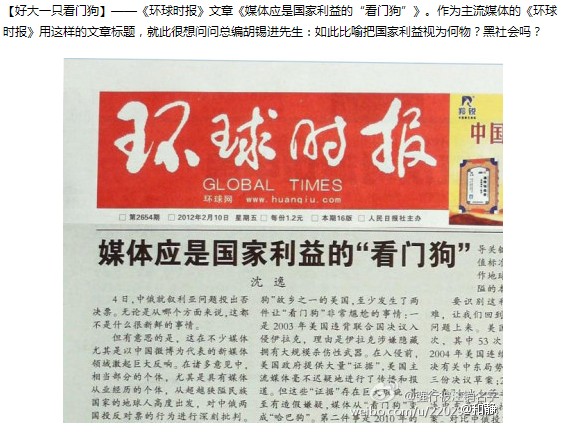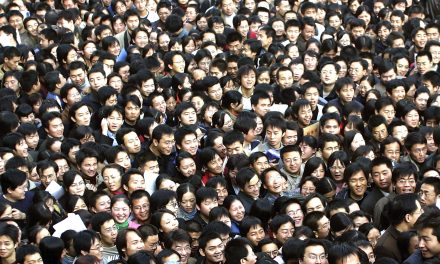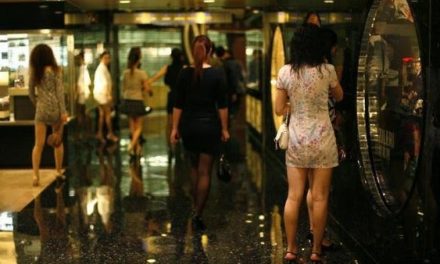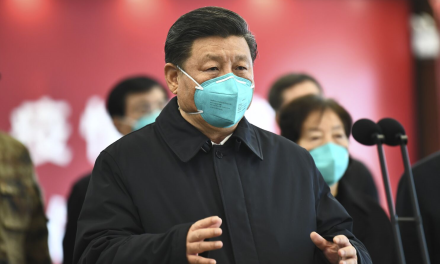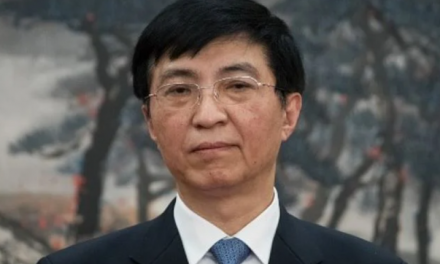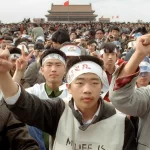Note: The piece praises the analysis of Qin Hui, who was for many years a professor of Chinese history at Tsinghua University in Beijing. Since retiring there, he has taught at the Chinese University of Hong Kong. Here the author tells of Prof. Qin’s analysis of the distortion, by the CCP and the Chinese people under it, of right and wrong.
Headline from the Chinese government news organ The Global Times — “Media should be the great watchdog for the national interest.” For such a headline to appear in such a place makes on wish to ask editor Hu Xijin, to use such a word is a metaphor for whose national interest? That of a criminal gang?
Different people may interpret the same noun’s definition and its connotation in completely opposite ways.
For example, Professor Qin Hui has put forward the term “downplaying human rights,” by which he originally meant that China stimulated economic development by ignoring the rights of workers and peasants and allowing capitalism to grow savagely. After the outbreak of the COVID epidemic and China’s adoption of the zero-COVID policy, Professor Qin also made clear that China’s epidemic-prevention model is also a reflection of “downplaying human rights,” that is, sacrificing the people’s freedoms and livelihoods in exchange for successful prevention and control of COVID. (If we consider suppressing spread of the virus as the only measure of success, it was indeed successful, but only until 2022.)
But in the eyes of the official announcements, the Wumao [Internet trolls], and the Little Pinks [extreme online nationalists], “downplaying human rights” refers to millions of deaths in the United States, open-air cremations in India, and morgues in Europe full of people. They believe that these countries, “heedless of” the epidemic, allowed it to spread and a large number of deaths in exchange for “herd immunity,” and that this is the actual manifestation of “ignoring human rights.” The Chinese government protected its people from being infected and thus protected their health and lives. It is the Chinese government that cares about human life, values human rights.
Obviously, this interpretation is completely opposite to that Qin Hui originally intended. Qin Hui made it clear that China’s zero-COVID model, with prevention and control occurring at any cost, is the “deprioritizing of human rights”; while in the West the goal of epidemic prevention and control, could not be achieved by infringing on their people’s freedoms, and therefore it is they who “downplay human rights.”
The reason why there is a completely opposite understanding of “downplaying of human rights” is that these Wumao and Little Pinks have a completely opposite view from that of Qin Hui of what “human rights” specifically refers to.
The “downplaying of human rights” noted by Qin Hui refers to the negative impact of epidemic prevention on such human rights as freedom, dignity, livelihood, material comfort and other aspects of daily life. To the extent possible, prevention and control should not affect the normal life of the people and the normal functioning of society, which is the embodiment of respect for human rights.
The “downplaying of human rights” is said by the Wumao and Little Pinks to mean the large number of infections and deaths caused by the “inaction/non-lockdown” of Western governments.
Qin Hui’s understanding of “deprioritizing human rights” is that of a normal person with good values in a normal society; the Wumao/Little Pink understanding of it is that produced by China’s abnormal society, abnormal education, abnormal values. In this framework, the understanding of what is right and what is wrong is distorted or even completely reversed.
In China, officials like to say that “Human rights are first and foremost the right to survival and development,” and without these, freedom and dignity, are all burdens.
From this example one can clearly see the difference more broadly between Chinese values versus normal human values.
In addition to this deformed interpretation of “deprioritizing human rights,” Chinese officials and the Chinese people also have very different and rather deformed conceptions and interpretations from the international mainstream on many issues.
For example, Chinese officials have long belittled the upheavals in Eastern Europe and the then former Soviet Union in the late 1980s and 1990s and the subsequent transformation there, claiming that these countries used “shock therapy” to cause soaring prices, economic collapse, and the destruction of the people’s livelihood. At the same time, they claim that after China’s reform and opening up, the country implemented steady economic reform and achieved a smooth economic transition.
In fact this is not true, or at least it is not the complete truth. Professor Qin conducted research into the facts, and presented what he discovered with his wife Ms. Jin Yan.
First of all, each of the transformations of Eastern European countries has its own characteristics, and not all implemented “shock therapy,” only Russia, Hungary and a handful of others. The others chose more graduat reforms. Second, whether or not they initiated “shock therapy,” during economic reform most countries paid a great deal of attention to the welfare and protection of workers and farmers to make the transition easier. Even if overall the reform was radical, the general public also still received basic income and welfare guarantees. The people in some countries with relatively successful reforms, such as Poland, the Czech Republic, and Hungary, have seen greatly improved standards of living. Third, the situation in China is precisely the opposite. China claims to have “refused to engage in Western liberalization” and to have reformed steadily, but the specific reform measures have ignored the rights and interests of workers and peasants. For example, mass layoffs caused tens of millions of people to lose their jobs. When state-owned enterprises and public institutions were restructured, state-owned property was sold at a low price without the consent of ordinary employees. The process was far more brutal than the ownership transformation in Eastern Europe. And China’s “price breakthrough,” the speed of the price rises after the ending of controlled state prices for many goods, and the impact on the living standards of ordinary Chinese people, have also been worse than what occurred in most countries in Eastern Europe.
Obviously, according to normal standards, Eastern European countries are relatively “moderate” and “stable,” and it is China’s reforms that were “radical” and “extreme.” However, Chinese officials and the Chinese people turn a blind eye to such facts and even deliberately distort them in order to smear Eastern Europe’s transformation, based as it is on democratic politics, a market economy, and the welfare state, and to whitewash all manner of ugliness in China’s reform and opening up in order to preserve “socialism with Chinese characteristics.”
Professor Qin has also mentioned many times in articles and interviews that in most countries around the world, the social-welfare system is oriented toward the disadvantaged in society. The more poor, disabled, or struggling people are, the more benefits they receive from the government. Those with higher incomes and status receive relatively less benefits and pay more taxes. However, in China the more powerful people are, the more benefits they get, while as people are poorer and less socially well-off, their social security decreases, or even approaches zero. (Professor Qin has a very accurate term for this, “negative welfare.”) But Chinese people seem to be accustomed to this Chinese-style welfare system, and believe that it is only natural that the poor get poorer and the rich get richer.
In addition, the evaluation of Chinese and foreign historical figures and events can also reflect the distorted values of the CCP’s official propaganda department. For example, when evaluating the leaders of the Soviet Union, the official propaganda highly praises Stalin, who carried out mass purges, suppressed workers and peasants, created famine, and engaged in foreign hegemony while Gorbachev, who defended peace, is painted in colors of disgust and even hatred.
When evaluating ancient Chinese dynasties, officials (and some brainwashed Chinese people) praise the brutal Qin Dynasty, the powerful Han Dynasty and Tang Dynasty, and the Qing Dynasty, which oppressed and enslaved the masses. But they do not hesitate to belittle and ridicule the civilized but relatively weak Song Dynasty. In fact, during the Song’s peaceful era, the material welfare and legal protection of the people were far better than during the Qin, Han, Tang and Qing Dynasties.
This pattern in public opinion seems to have changed a bit in the past one or two years, the reason probably deriving from the epidemic and epidemic-prevention measures having greatly damaged the people’s rights and their livelihood, making vested interests who have never cared about human rights and humanity realize the importance of rights and freedom. But all manner of social Darwinist values, which favor the strong over the weak and do not talk of right and wrong but only of fists, still prevail in China.
These examples all show that under the control, enslavement, and brainwashing of the CCP regime, the values, reasoning, words and behavior of many Chinese, as well as the public opinion and the atmosphere of the entire Chinese society have all been highly distorted, and are incompatible with or even completely the opposite of those of normal countries. The Chinese regard beauty as ugliness and ugliness as beauty, and yet accuse foreigners, especially Europeans and Americans, of having distorted and perverted values. The Chinese people are completely devoid of judgment and moral conscience.
Many of the comparisons between the Chinese and the foreign I have listed come from Professor Qin’s research results or from debates about them. This is not a coincidence, because he is the one scholar in today’s China who best understands the CCP’s history and reality, and can best clarify how “socialism with Chinese characteristics” differs from universal values.
In fact, many things Professor Qin says are common sense and taken for granted in normal countries, especially developed countries in Europe and North America. But in China they are regarded as “heresy,” as shocking ways of thinking. This just reflects the lack of common sense, and the poor basic reasoning and judgment of Chinese people who have been brainwashed by the CCP. Professor Qin is keenly aware of this, and has enlightened the people of the country in an easy-to-understand way, which is a great achievement.
[The article was first published by Yibao. When retransmitting please add the source and link before the text: https://www.yibao.net/2023/03/13/misinterpreting-downplaying-human-rights-from-official-pronouncements-seeing-the-distortion-in-ccp-values/]
[The author’s opinion does not represent the opinion of this journal.]

